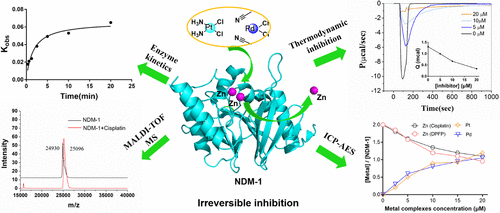当前位置:
X-MOL 学术
›
ACS Infect. Dis.
›
论文详情
Our official English website, www.x-mol.net, welcomes your
feedback! (Note: you will need to create a separate account there.)
Identification of Cisplatin and Palladium(II) Complexes as Potent Metallo-β-lactamase Inhibitors for Targeting Carbapenem-Resistant Enterobacteriaceae.
ACS Infectious Diseases ( IF 4.0 ) Pub Date : 2020-03-11 , DOI: 10.1021/acsinfecdis.9b00385 Cheng Chen 1 , Le-Yun Sun 1 , Han Gao 1 , Peng-Wei Kang 1 , Jia-Qi Li 1 , Jian-Bin Zhen 1 , Ke-Wu Yang 1
ACS Infectious Diseases ( IF 4.0 ) Pub Date : 2020-03-11 , DOI: 10.1021/acsinfecdis.9b00385 Cheng Chen 1 , Le-Yun Sun 1 , Han Gao 1 , Peng-Wei Kang 1 , Jia-Qi Li 1 , Jian-Bin Zhen 1 , Ke-Wu Yang 1
Affiliation

|
The emergence and prevalence of carbapenem-resistant bacterial infection have seriously threatened the clinical use of almost all β-lactam antibacterials. The development of effective metallo-β-lactamase (MβL) inhibitors to restore the existing antibiotics efficacy is an ideal alternative. Although several types of serine-β-lactamase inhibitors have been successfully developed and used in clinical settings, MβL inhibitors are not clinically available to date. Herein, we identified that cisplatin and Pd(II) complexes are potent broad-spectrum inhibitors of the B1 and B2 subclasses of MβLs and effectively revived Meropenem efficacy against MβL-expressing bacteria in vitro. Enzyme kinetics, thermodynamics, inductively coupled plasma atomic emission spectrometry (ICP-AES), matrix-assisted laser desorption/ionization-time of flight-mass spectrometry (MALDI-TOF-MS), and site-directed mutation assays revealed that these metal complexes irreversibly inhibited NDM-1 through a novel inhibition mode involving binding to Cys208 and displacing one Zn(II) ion of the enzyme with one Pt(II) containing two NH3's or one Pd(II) ion. Importantly, the combination therapy of Meropenem and metal complexes significantly suppressed the development of higher-level resistance in bacteria producing NDM-1, also effectively reduced the bacterial burden in liver and spleen of mice infected by carbapenem-resistant Enterobacteriaceae producing NDM-1. These findings will offer potential lead compounds for the further development of clinically useful inhibitors targeting MβLs.
中文翻译:

顺铂和钯(II)配合物作为靶向碳青霉烯抗性肠杆菌科的强金属β-内酰胺酶抑制剂的鉴定。
耐碳青霉烯类细菌感染的出现和流行严重威胁了几乎所有β-内酰胺类抗生素的临床应用。开发有效的金属-β-内酰胺酶(MβL)抑制剂以恢复现有抗生素功效是一种理想的选择。尽管已经成功开发了几种类型的丝氨酸-β-内酰胺酶抑制剂,并将其用于临床,但迄今为止,MβL抑制剂尚无临床可用。在本文中,我们确定了顺铂和Pd(II)配合物是MβLsB1和B2亚类的有效广谱抑制剂,并在体外有效恢复了美罗培南对表达MβL的细菌的功效。酶动力学,热力学,电感耦合等离子体原子发射光谱法(ICP-AES),基质辅助激光解吸/电离飞行时间质谱(MALDI-TOF-MS)和定点突变分析表明,这些金属配合物通过一种新颖的抑制方式不可逆地抑制NDM-1,涉及结合Cys208和置换一个Cys208酶的Zn(II)离子与一个含两个NH3的Pt(II)或一个Pd(II)离子。重要的是,美罗培南和金属配合物的联合治疗显着抑制了产生NDM-1的细菌中高水平抗药性的发展,还有效地减轻了受到耐碳青霉烯肠杆菌科NDM-1感染的小鼠肝脏和脾脏的细菌负担。这些发现将为进一步开发针对MβLs的临床有用抑制剂提供潜在的先导化合物。和定点突变分析表明,这些金属配合物通过一种新型抑制模式不可逆地抑制NDM-1,该模式包括与Cys208结合并用一个含两个NH3或一个Pd(II)的Pt(II)取代酶的一个Zn(II)离子。 )离子。重要的是,美罗培南和金属配合物的联合治疗显着抑制了产生NDM-1的细菌中高水平抗药性的发展,还有效地减轻了受到耐碳青霉烯肠杆菌科NDM-1感染的小鼠肝脏和脾脏的细菌负担。这些发现将为进一步开发针对MβLs的临床有用抑制剂提供潜在的先导化合物。和定点突变分析表明,这些金属配合物通过一种新型抑制模式不可逆地抑制NDM-1,该模式包括与Cys208结合并用一个含两个NH3或一个Pd(II)的Pt(II)取代酶的一个Zn(II)离子。 )离子。重要的是,美罗培南和金属配合物的联合治疗显着抑制了产生NDM-1的细菌中高水平抗药性的发展,还有效地减轻了受到耐碳青霉烯肠杆菌科NDM-1感染的小鼠肝脏和脾脏的细菌负担。这些发现将为进一步开发针对MβLs的临床有用抑制剂提供潜在的先导化合物。
更新日期:2020-03-02
中文翻译:

顺铂和钯(II)配合物作为靶向碳青霉烯抗性肠杆菌科的强金属β-内酰胺酶抑制剂的鉴定。
耐碳青霉烯类细菌感染的出现和流行严重威胁了几乎所有β-内酰胺类抗生素的临床应用。开发有效的金属-β-内酰胺酶(MβL)抑制剂以恢复现有抗生素功效是一种理想的选择。尽管已经成功开发了几种类型的丝氨酸-β-内酰胺酶抑制剂,并将其用于临床,但迄今为止,MβL抑制剂尚无临床可用。在本文中,我们确定了顺铂和Pd(II)配合物是MβLsB1和B2亚类的有效广谱抑制剂,并在体外有效恢复了美罗培南对表达MβL的细菌的功效。酶动力学,热力学,电感耦合等离子体原子发射光谱法(ICP-AES),基质辅助激光解吸/电离飞行时间质谱(MALDI-TOF-MS)和定点突变分析表明,这些金属配合物通过一种新颖的抑制方式不可逆地抑制NDM-1,涉及结合Cys208和置换一个Cys208酶的Zn(II)离子与一个含两个NH3的Pt(II)或一个Pd(II)离子。重要的是,美罗培南和金属配合物的联合治疗显着抑制了产生NDM-1的细菌中高水平抗药性的发展,还有效地减轻了受到耐碳青霉烯肠杆菌科NDM-1感染的小鼠肝脏和脾脏的细菌负担。这些发现将为进一步开发针对MβLs的临床有用抑制剂提供潜在的先导化合物。和定点突变分析表明,这些金属配合物通过一种新型抑制模式不可逆地抑制NDM-1,该模式包括与Cys208结合并用一个含两个NH3或一个Pd(II)的Pt(II)取代酶的一个Zn(II)离子。 )离子。重要的是,美罗培南和金属配合物的联合治疗显着抑制了产生NDM-1的细菌中高水平抗药性的发展,还有效地减轻了受到耐碳青霉烯肠杆菌科NDM-1感染的小鼠肝脏和脾脏的细菌负担。这些发现将为进一步开发针对MβLs的临床有用抑制剂提供潜在的先导化合物。和定点突变分析表明,这些金属配合物通过一种新型抑制模式不可逆地抑制NDM-1,该模式包括与Cys208结合并用一个含两个NH3或一个Pd(II)的Pt(II)取代酶的一个Zn(II)离子。 )离子。重要的是,美罗培南和金属配合物的联合治疗显着抑制了产生NDM-1的细菌中高水平抗药性的发展,还有效地减轻了受到耐碳青霉烯肠杆菌科NDM-1感染的小鼠肝脏和脾脏的细菌负担。这些发现将为进一步开发针对MβLs的临床有用抑制剂提供潜在的先导化合物。











































 京公网安备 11010802027423号
京公网安备 11010802027423号